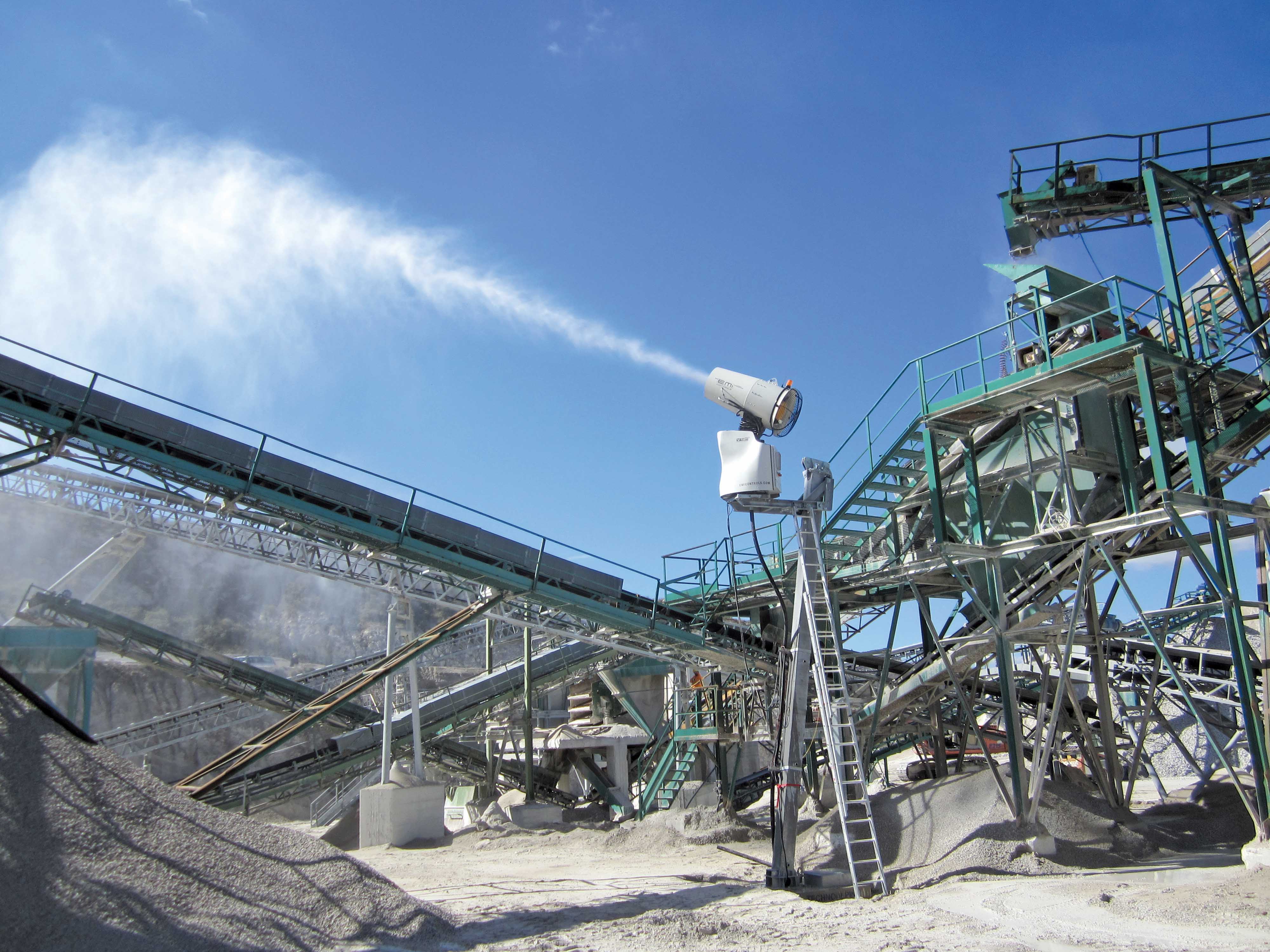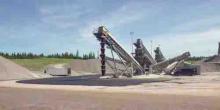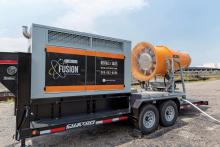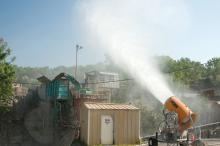
Controlling and managing dust in any quarry or construction operation is vital for efficient working and good health and safety. Guy Woodford reports.
A global leader in dust management technology has developed a versatile and transportable atomised mist unit, said to combine a workhorse electric dust suppression design with a 45kW generator set. In response to customer input from several different industries,
“Controlling air quality is essential for communities surrounding a construction or demolition project, but even in places with little infrastructure, dust can choke worksites and foul equipment,” said DCT president Laura Stiverson. “We engineered the Fusion to be highly mobile, with its own power source, able to be easily towed anywhere on a job site.”
The DB-60 Fusion forces water through a circular stainless steel manifold with 30 atomising spray nozzles, then launches millions of tiny droplets with a powerful 25kW fan that produces 30,000 CFM (849.50 CMM) of air flow. Atomised mist droplets of 50 to 200 microns in size are thrown out in a 60m cone at an adjustable 0 to 50° elevation angle, capturing airborne dust particles and dragging them to the ground. Unlike industrial sprinklers used for the same purpose, which can require 1,893 litres/minute or more of water, the DB-60 uses about 87litres/minute to help avoid pooling or runoff.
The unit is paired with a 45kW gen set featuring a
“We’ve seen competing designs on the market that have a diesel engine powering the dust suppressor, using a drive belt system similar to a vehicle,” says Stiverson. “In comparison, the direct drive electric motor used in the Fusion dramatically reduces maintenance requirements, delivering superior reliability and long service life.”
The DB-60 and gen set are mounted together on a heavy-duty trailer with a steel frame and roadworthy tyres for towing at highway speeds. Weighing 2.97tonnes, it can be towed by almost any vehicle with suitable towing capacity equipped with a Class IV ball hitch.
At just 2.03m wide, it can be placed virtually anywhere dust suppression is needed, and adjusted based on changes in wind or work activity. The optional dosing pump is powered from the standard 120V electrical outlet on the gen set, allowing operators to precisely meter surfactants or other additives. The unit’s versatility makes it suitable for uneven ground, as well as open spaces or tiered terrain.
Water sources can vary, and the unit requires a constant supply pressure of just .069 BAR.
Standard municipal water pressures are generally around 3.44BAR. The water is delivered through a 38.1mm hose with a cam-and-groove quick disconnect coupling leading to the booster pump.
The pump adds approximately 10.34BAR, with a maximum of 17.23BAR, depending on the inlet pressure. For use with a non-potable water source, the Fusion is equipped with an in-line 30 mesh, 595 micron filter system that can be easily cleaned.
A touchscreen panel for controlling the dust suppression unit is encased in a NEMA 3R cabinet, allowing operators to control oscillation, booster pump, fan and water. The cabinet is constructed for outdoor use, designed to provide protection against ingress of solid foreign objects (such as dirt), air (dust, emissions), water (rain, sleet, snow) and ice formation.
In addition to the control panel for the DustBoss, the unit features a convenient on/off function for the gen set located outside the generator itself. Full control and maintenance readings are located on a control panel inside, but operators do not need to access the interior to turn it on and off.
Maintenance requirements for the new design are said by DCT to be minimal, even though the unit carries a claimed industry-leading 3-year/3000-hour warranty on the dust suppressor, and a 2-year/2000-hour warranty on the gen set. If potable water is being used, nozzles typically need to be inspected just once per year. The turntable bearing on the oscillator should be greased annually or as needed for harsh service conditions, and the fan’s motor and high-pressure pump should be lubricated every 10,000 hours. Like any diesel engine, the gen set should have regular inspections and changing of oil, coolant and filters.
Said to use less energy and water than competitor models, while also working at a lower noise, the 30 adjustable-size nozzles in the patented turbine on all four models are said by the Bolzano, Italy-headquartered firm to offer far greater flexibility of water use than that allowed by the dust controllers of rival brands.
The popular, safe and simple to use V22 model, which, like the three other ‘V’ series EmiControls dust controllers can be a stationary or mobile, with trailer, solution, is capable in mobile applications of covering 70-75m. The V12 and V12S can cover 45-50m, and the V7’s coverage is 30-35m.
Three mobile, trailer-mounted V22 dust controllers with submergible pumps are currently being used instead of sprinklers on haul roads across a number of quarry sites owned by one prominent Qatar-based company. The three are in addition to 20 other fixed installation V22 models being used by the firm. In Europe, a German quarry owner is using two V12S dust controllers fitted with wind and temperature sensor triggered automatic operation.
“The German customer wanted the units, for example, to turn 30 degrees to the left in a specific wind direction, and for the units to stop working when it rains, or when the temperature is less than three degrees Celsius,” explains a spokesperson of EmiControls, part of
Going into more detail about the nozzles on the Friedrich-Alexander University Erlangen-Nürnberg and EmiControls developed and patented V series turbines, the EmiControls spokesperson adds: “The 30 nozzles on our models are less than the number found on our competitor units. Our nozzles are ceramic and 12, 18 or all 30 nozzles can be used at any one time. You can change the size of the holes on each nozzle, which means you can work with as little as 16litres a minute of water, for example to deal with wood dust. We have invested in a very good quality pump on our models which allows them to work with 16 to 110litres/minute of water, always at 20bar pressure.”
EmiControls’ team of engineers and designers are said to be constantly working on technical and quality improvements to the firm’s machines, always looking to meet market demand for solutions that reduce energy costs and conserve water.
An example of this is the High Pressure H1 dust controller, and the newest EmiControls machine, the E46, for dynamic evaporation to be used where the natural transpiration is not enough to eliminate acid water or something similar in a hazardous area.







